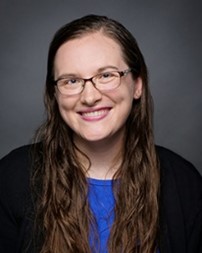
Call for Participation
Ctrl, Alt, Delete? Meeting Gen Z’s Expectations in the Design and Utilization of Technologies in Higher Education in a Post-Covid World
Monday 1 July 2024, 13:30 - 17:30
Organizers
Martha Hubertz, University of Central Florida, USA, martha.hubertz@ucf.edu
Florence Williams, University of Central Florida, USA, florence.williams@ucf.edu
Joseph Lloyd, University of Central Florida, USA, joseph.lloyd@ucf.edu
Rebecca McNulty, University of Central Florida, USA, rebecca.mcnulty@ucf.edu
The workshop aims to facilitate knowledge sharing of the discrete challenges in meeting the technology needs and expectations of Gen Z.
A collective discussion and co-creation of a position paper in relation to the presented challenges will commence during the workshop and will be completed after the workshop's conclusion. The manuscript will be submitted to the International Journal of Human-Computer Interaction (IJHCI) for publication consideration.
Expected outcomes include a discussion of how Higher Education can attempt to keep pace with students’ technological expectations and share best practices for technology integration. In addition, the workshop will support the development of UDL (Universal Design for Learning) principles in course design and delivery regarding technology.
Participating authors will have the option of publishing their contribution in conference proceedings published by Springer as part of the CCIS series, for presentation at the Conference and inclusion in the “Late Breaking Work” conference proceedings.
The following is a framework for the program of the workshop:
The workshop will be hosted in a hybrid setting, and it will span four hours comprising two parts.
|
Time |
Program event |
|
13:30 - 15:30 |
Keynote and presentations |
|
15:30 – 16:00 |
Refreshment Break |
|
16:00 – 17:30 |
Roundtable discussion |
Workshop participants will be invited to continue the co-creation of the manuscript intended for submission to the above-mentioned journal (IJHCI), in which they will elaborate on the identified problem areas and propose a research agenda.
Prospective authors should submit their proposals in PDF format through the HCII Conference Management System (CMS).
We invite prospective authors to submit position papers, research, or best practices on any of the topics for the workshop.
Research Papers should be a minimum of 4 pages and a maximum of 8 pages in length, with an optimal length of 6 pages. The submissions should include sections such as Abstract, Introduction, Methodology, Results, Discussion, and Conclusion.
Position Papers or Best Practices submissions are not formal research but should provide valuable insights or best practices in the field. They should be well-structured and clearly articulate a position or a set of best practices, backed by evidence or experience. The length of these papers can vary, but we recommend a minimum of 4 pages and a maximum of 8 pages in length, with an optimal length of 6 pages to keep papers concise and focused.
All submissions should be in PDF format and submitted through the HCII Conference Management System (CMS). Please ensure that your submission is well-structured, free of grammatical errors, and adheres to the HCII 2024 formatting guidelines.
We welcome diverse contributions and look forward to a fruitful discussion at the workshop!
The contributions to be presented in Workshops will not be automatically included in the Conference proceedings.
However, after consultation with the Workshop Organizer(s), authors of accepted workshop proposals that are registered for the conference are welcome to submit, through the HCII Conference Management System (CMS), an extended version of their workshop contribution to be considered, following further peer review, for presentation at the Conference and inclusion in the “Late Breaking Work” conference proceedings, either in the LNCS as a long paper (typically 12 pages, but no less than 10 and no more than 20 pages), or in the CCIS as a short paper (typically 6 pages, but no less than 4 and no more than 11). The submission deadline for the camera-ready papers (long or short) for the “Late Breaking Work” Volumes of the Proceedings is the 24th of May 2024.
Workshop organizers will prepare a paper that captures the collaborative efforts of our workshop participants. This paper will present the innovative ideas and discussions that emerge from our workshop for inclusion in the HCII2025 Conference Proceedings.
|
Submission of workshop contributions |
5 April 2024 |
|
Authors notified of decisions on acceptance |
12 April 2024 |
|
Finalization of workshop organization and registration of participants |
10 May 2024 |

Martha Hubertz, Ph. D.
Contact: martha.hubertz@ucf.edu | LinkedIn
Martha Hubertz is an associate lecturer of psychology at the University of Central Florida (UCF). She has a Ph.D. in social psychology from Florida Atlantic University and joined UCF in 2018. She teaches various courses in psychology and is also actively involved in mentoring students and conducting research in her field.
Martha Hubertz has received several awards for her teaching excellence and innovation. She won the Chuck D. Dziuban Award for Excellence in Online Teaching in 2020, the Rick Schell Award for Writing Across the Curriculum in 2019, and a Teaching Incentive Award in 2019.

Florence Williams, Ph.D.
Contact: florence.williams@ucf.edu | LinkedIn
Florence is an accomplished instructional designer at the University of Central Florida. She joined the team in 2020 with over two decades of experience in Education and a background of working in both public and private university environments. In her role, Florence focuses on enhancing course design and instructional methods for faculty. She provides pedagogical support to faculty members, offering coaching and mentoring for creating online and blended courses. Flo has held various leadership and faculty development positions, consistently advocating for excellence through technology integration and curriculum enhancement.
Florence shares her work nationally and internationally on her research interests of inclusive excellence and the potential benefits of emerging technologies in teaching and learning.

Joseph Lloyd, M. Ed.
Contact: joseph.lloyd@ucf.edu | LinkedIn
Joseph Lloyd is an instructional designer at the University of Central Florida’s Center for Distributed Learning. Joseph earned a B.S. degree in Information Technology from the University of Cincinnati in 2003 and an M.Ed. in Curriculum and Instruction with a focus in Middle Childhood Mathematics, which he earned from UC in 2009.
Prior to joining UCF, Joseph taught in both Volusia and Seminole County Public Schools for twelve years. He spent most of those years as an Educational Technology Facilitator, and he also taught 4th, 5th & 6th Grades Math & Science. His love of the blending of Education and Technology, especially in the STEM (Science, Technology, Engineering, and Mathematics) disciplines led him to UCF where he joined the team that specializes in personalized adaptive learning software and strategies. He also teaches in the School of Teacher Education focusing on Elementary Math Education.

Rebecca McNulty, Ph. D.
Contact: Rebecca.McNulty@ucf.edu | LinkedIn
Rebecca McNulty is an instructional designer at the University of Central Florida’s Center for Distributed Learning. She holds a PhD in English from the University of Florida, where she taught a wide variety of courses and worked as a graduate assistant to LibraryPress@UF. At the University of Central Florida, she contributes to the design and development of personalized adaptive learning courses.
Rebecca also works with initiatives focusing on faculty development and open educational practices. Her main research interests include the intersection between narrative theory and electronic course design and the changing ways that artificial intelligence influences student learning outcomes.
Ang, C. S., Lee, K. F., & Dipolog-Ubanan, G. F. (2019). Determinants of first-year student identity and satisfaction in higher education: A quantitative case study. SAGE Open, 9(2), 2158244019846689. https://journals.sagepub.com/doi/abs/10.1177/2158244019846689
Drent, M., & Meelissen, M. (2008). Which factors obstruct or stimulate teacher educators to use ICT innovatively? Computers & education, 51(1), 187-199.
Hesse, F. W., Kobsda, C., Schemmann, C., GLC, G. L. C., & Austauschdienst eV, D. A. (2022). Digital Transformation of Higher Education-Global Learning Report 2022.
Keane, T., Linden, T., Hernandez-Martinez, P. et al. Digital technologies: students’ expectations and experiences during their transition from high school to university. Educ Inf Technol 28, 857–877 (2023). https://doi.org/10.1007/s10639-022-11184-4
Oblinger, D., & Oblinger, J. (2005). Is it age or IT: First steps toward understanding the net generation. Educating the net generation, 2(1-2), 20.
Santos, H., Batista, J., & Marques, R. P. (2019). Digital transformation in higher education: the use of communication technologies by students. Procedia Computer Science, 164, 123-130. https://www.sciencedirect.com/science/article/pii/S1877050919322021
Selwyn, N. (2016). Is technology good for education? John Wiley & Sons.
Tapscott, D. (2010). Grown up digital. How the net generation is changing your world. International Journal of Market Research, 52(1), 139.
Technology One (2019). New research: What do students want from their university experience? https://info.technologyonecorp.co.uk/student-survey
Waycott, J., Sheard, J., Thompson, C., & Clerehan, R. (2013). Making students' work visible on the social web: A blessing or a curse? Computers & Education, 68, 86-95.
Zhao, Y., Llorente, A.M.P, & Gómez, M.C.S. (2021). Digital competence in higher education research: A systematic literature review. Computers & Education, 168. 1-14. https://doi.org/10.1016/j.compedu.2021.104212
Workshops will run as 'hybrid' events. Participants will have the option to attend either in-person or virtually. The total number of participants per workshop cannot be less than 8 or exceed 25.
Workshops are ‘closed’ events, i.e. only authors of accepted workshop proposals, registered for the specific workshop, will be able to attend.
Registration for workshops is complimentary for registered conference participants.